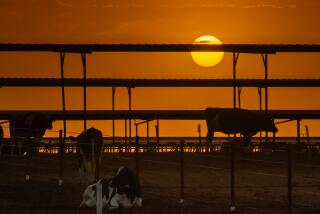Mad Cow Risk Is Downplayed
- Share via
WASHINGTON — After reviewing an expert panel’s report that the U.S. probably has undiscovered cases of mad cow disease, Agriculture Secretary Ann M. Veneman said there still was no cause for alarm.
“I don’t think we have a significant issue in this country,” Veneman said Thursday. “But we are going to take it seriously.”
The report by a team of five scientists convened by Veneman said some U.S. cattle would be carrying the brain-wasting illness, formally known as bovine spongiform encephalopathy.
Cattle can get the disease by eating feed that contains tissue from the brain, spinal cord or lower small intestine of an infected animal. Contaminated feed is the likely source of the nation’s first case of the illness, in a dairy cow in Washington state.
The scientists said some animals that ate such feed were later slaughtered and processed into protein for other cattle meal, spreading the infection.
The Food and Drug Administration has banned such feed for cattle and other grazing animals since 1997.
Veneman said the panel’s finding was in line with a 2001 Harvard study of America’s vulnerability to the disease. The study predicted that any mad cow cases would be rare and that the disease eventually could be eliminated by keeping the misshapen protein that is the source of the disease out of the feed supply.
The panel’s report was turned over to the Secretary’s Advisory Committee on Foreign Animal and Poultry Diseases, which will review the findings for about a week before making its own recommendations.
The scientific panel evaluated the effectiveness of U.S. protections against mad cow disease. It recommended banning any animal or poultry protein in feed for cattle and other grazing animals.
More to Read
Sign up for Essential California
The most important California stories and recommendations in your inbox every morning.
You may occasionally receive promotional content from the Los Angeles Times.













